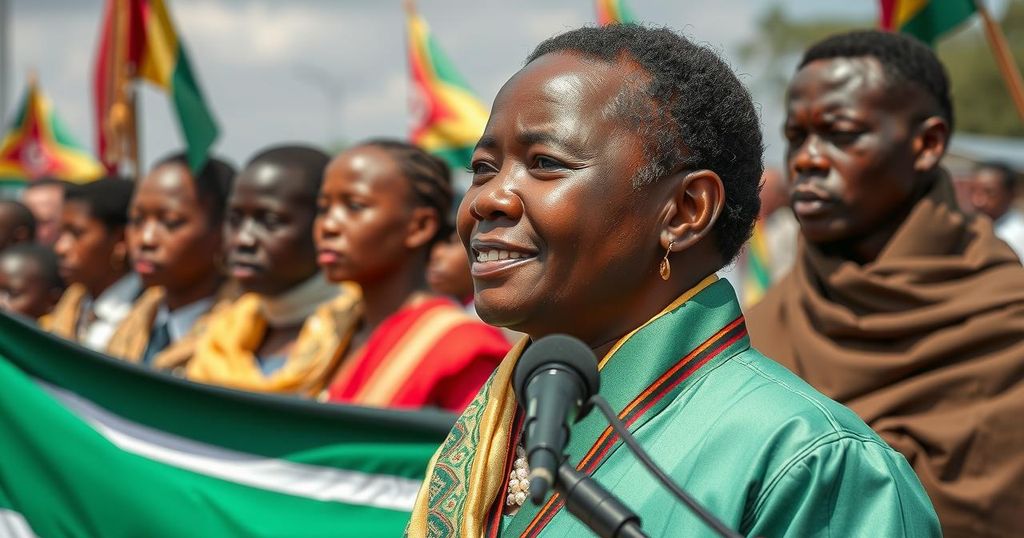South Sudan has postponed its elections until December 2026 due to insufficient preparations, raising concerns about its capacity to achieve democracy. The article argues that deep-rooted structural problems, ethnic favoritism, and ineffective international interventions have hindered the country’s political evolution since its independence. A citizen-led national dialogue is essential to redefine the governance framework and address issues of identity and justice, facilitating true democratic progression.
On September 18, 2024, the transitional government of South Sudan announced a postponement of elections until December 2026, citing the lack of essential legal, financial, and technical preparations for credible electoral processes. This decision prompts a significant inquiry regarding South Sudan’s potential to transition successfully to a democratic system and what measures would be necessary to achieve this goal.
The genesis of South Sudan’s crises can be traced back to its establishment as an independent nation in 2011. Initially, the pursuit of statehood did not equip the citizenry with the means to create effective governmental structures. Rather, post-independence governance has favored certain ethnic factions, perpetuating a centralized power dynamic that stifles local participation and alienates ordinary citizens. This governance approach has fostered a superficial sense of national unity amidst enduring ethnic and regional conflicts.
Although the citizens of South Sudan must acknowledge their role in the prevailing turmoil, it is essential to recognize that the international community’s perspectives and policies have exacerbated the situation. The prevailing view characterizes South Sudan predominantly as a humanitarian crisis requiring immediate aid, intervention, and electoral support, rather than a potential hub for investment and economic progress.
Since the onset of civil conflict in 2013, two internationally supported peace agreements—arrived at in 2015 and 2018—have failed to redress the fundamental issues afflicting the nation. Instead, these accords have reinforced the status quo, privileging the interests of unelected leaders while leaving the general populace without access to democratic institutions that are genuinely inclusive and responsive to their needs.
The necessity for a comprehensive approach to redress South Sudan’s challenges cannot be overstated. While elections may cultivate initial trust in the political framework, they are incapable of addressing deeply ingrained structural issues. The roots of South Sudan’s current state stem not only from a history of conflict but also from colonial legacies that paved the way for authoritarian governance post-independence. Therefore, the imperative lies in promoting a new concept of independence, emphasizing the establishment of robust political, economic, and security architectures capable of managing the nation’s complex identity.
To initiate a transformative process, the citizens of South Sudan must begin with introspection and engage in sincere discussions regarding the failures that have marked their journey. It is crucial for South Sudanese to define their problems and construct an agenda that prioritizes national stability and progress. A pressing question revolves around disentangling ethnic identities from state identity and redefining the essence of nationhood. Thus, the central concerns include how to attain consensus on establishing a democratic state centered on citizenship and how to address justice effectively.
Currently, the discussions shaping South Sudan’s future are disorganized and fraught with tension. In the absence of a legitimate political framework, marginalized groups are increasingly resorting to violence to claim their rights. It is of utmost importance to facilitate a national dialogue involving diverse groups from the political, civic, religious, and regional spheres in order to reach an agreement on constructing a democratic framework. A national conference that duly represents the multiethnic fabric of the society, including substantial female and youth representation, could play a pivotal role in drafting a new constitution.
For South Sudan to attain the democratic ideals it endeavors to realize, the impetus must arise from within its society rather than through external interventions or flawed models. By fostering a citizen-led initiative to convene a national dialogue, the government can navigate past the pitfalls of elite-centric governance and extend the opportunity for the populace to redefine their national identity, facilitate a second independence, and lay the groundwork for sustainable growth and stability in South Sudan as well as the broader Horn of Africa.
This article examines the ongoing political challenges faced by South Sudan, particularly the implications of postponed elections scheduled for December 2026. It outlines the failure of previous governments to establish effective institutions following independence in 2011, as well as the adverse impact of international policies on the nation’s growth. The author emphasizes the importance of engaging South Sudanese citizens in the construction of a new political framework that prioritizes democratic values over ethnic divisions.
In conclusion, for South Sudan to move towards a truly democratic future, it must embark on a profound reassessment of its identity and governance framework. A national dialogue led by its citizens is critical to redefining its societal foundations, addressing structural inequalities, and forging a common commitment to the ideals of democracy. The nation stands at a crossroads, with the potential to either succumb to continued discord or to embrace a path toward unity, inclusiveness, and sustainable progress.
Original Source: www.radiotamazuj.org






